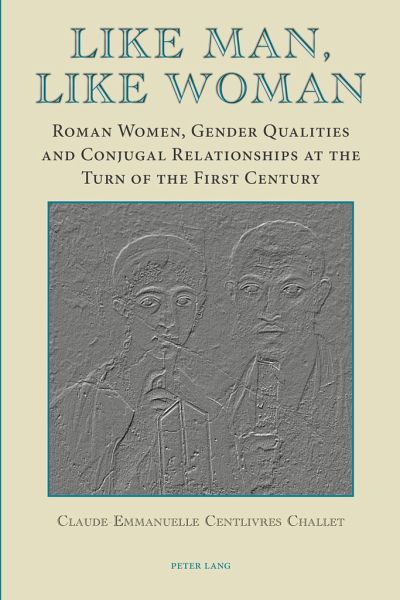
Like Man, Like Woman
Roman Women, Gender Qualities and Conjugal Relationships at the Turn of the First Century
Versandkostenfrei!
Versandfertig in 6-10 Tagen
74,60 €
inkl. MwSt.

PAYBACK Punkte
0 °P sammeln!
Modern scholarship often discusses Roman women in terms of their difference from their male counterparts, frequently defining them as 'other'. This book shows how Roman male writers at the turn of the first century actually described women as not so different from men: the same qualities and abilities pertaining to the domains of parenthood, intellect and morals are ascribed by writers to women as well as to men. There are two voices, however: a traditional, ideal voice and an individual, realistic voice. This creates a duality of representations of women, which recurs across literary genres a...
Modern scholarship often discusses Roman women in terms of their difference from their male counterparts, frequently defining them as 'other'. This book shows how Roman male writers at the turn of the first century actually described women as not so different from men: the same qualities and abilities pertaining to the domains of parenthood, intellect and morals are ascribed by writers to women as well as to men. There are two voices, however: a traditional, ideal voice and an individual, realistic voice. This creates a duality of representations of women, which recurs across literary genres and reflects a duality of mentality. How can we interpret the paradoxical information about Roman women given by the male-authored texts? How does this duality of mentality inform us about gender roles and gender hierarchy?
This work analyses well-known, as well as overlooked, passages from the writings of Pliny the Younger, Tacitus, Suetonius, Quintilian, Statius, Martial and Juvenal and sheds new light on Roman views of women and their abilities, on the notions of private and public and on conjugal relationships. In the process, the famous sixth satire of Juvenal is revisited and its topic reassessed, providing further insights into the complex issues of gender roles, marriage and emotions. By contrasting representations of women across a broad spectrum of literary genres, this book provides consistent findings that have wide significance for the study of Latin literature and the social history of the late first and early second centuries.
This work analyses well-known, as well as overlooked, passages from the writings of Pliny the Younger, Tacitus, Suetonius, Quintilian, Statius, Martial and Juvenal and sheds new light on Roman views of women and their abilities, on the notions of private and public and on conjugal relationships. In the process, the famous sixth satire of Juvenal is revisited and its topic reassessed, providing further insights into the complex issues of gender roles, marriage and emotions. By contrasting representations of women across a broad spectrum of literary genres, this book provides consistent findings that have wide significance for the study of Latin literature and the social history of the late first and early second centuries.














